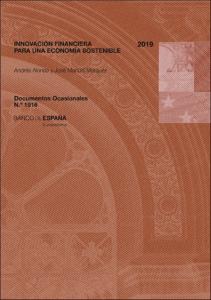Innovación financiera para una economía sostenible
Autor
Fecha de publicación
2-oct-2019
Descripción física
27 p.
Resumen
El cambio climático, su gestión y mitigación, constituye sin duda uno de los elementos de riesgo más importantes que afrontará nuestra sociedad en las próximas décadas. El sector financiero desempeña un papel fundamental en este reto, tanto por su exposición y las consiguientes implicaciones patrimoniales que pueden derivarse de la materialización de este riesgo como por su labor canalizando las inversiones necesarias para transformar nuestra economía en un modelo sostenible. En este artículo se revisan distintas iniciativas que están teniendo lugar en el sector financiero privado en el proceso de introducción de la variable «sostenibilidad» en la toma de decisiones, con el objetivo tanto de lograr un balance con una menor huella de carbono (transformación del stock) como de desarrollar una estrategia de negocio alineada con unos principios responsables acordes con los compromisos internacionales (transformación del flujo). Se analizan las innovaciones que están surgiendo en el camino hacia unas finanzas sostenibles en relación con 1) la aparición de nuevos proveedores y servicios en los mercados, 2) la creación de nuevos productos financieros con criterios de sostenibilidad, 3) la adaptación de la política de gestión de riesgos financieros, y 4) las interacciones entre los avances tecnológicos y el cambio climático.
Climate change and its management and mitigation are unquestionably among the main risks facing our society in the coming decades. The financial sector plays a key role in this challenge, firstly because of its exposure and the consequent capital shocks if this risk crystallises, and secondly because it has the task of financing the investments needed to transform our economy into a sustainable one. This article reviews various initiatives under way in the private financial sector to introduce the variable “sustainability” into its decision-making process in order to achieve a balance sheet with a smaller carbon footprint (transformation of stock) and to develop a business strategy aligned with responsible investment principles and international standards (transformation of flow). We analyse the innovations emerging along the path to sustainable finance, looking particularly at: 1) new suppliers and services in the market, 2) the creation of sustainability-linked financial instruments, 3) the adaptation of financial risk management policies, and 4) the interaction of technological progress with climate change.
Climate change and its management and mitigation are unquestionably among the main risks facing our society in the coming decades. The financial sector plays a key role in this challenge, firstly because of its exposure and the consequent capital shocks if this risk crystallises, and secondly because it has the task of financing the investments needed to transform our economy into a sustainable one. This article reviews various initiatives under way in the private financial sector to introduce the variable “sustainability” into its decision-making process in order to achieve a balance sheet with a smaller carbon footprint (transformation of stock) and to develop a business strategy aligned with responsible investment principles and international standards (transformation of flow). We analyse the innovations emerging along the path to sustainable finance, looking particularly at: 1) new suppliers and services in the market, 2) the creation of sustainability-linked financial instruments, 3) the adaptation of financial risk management policies, and 4) the interaction of technological progress with climate change.
Publicado en
Documentos Ocasionales / Banco de España, 1916
Otras versiones
Materias
Fintech; Principios de desarrollo sostenible; Cambio climático; Sostenibilidad; Bonos verdes; Innovación; Inteligencia artificial; Fintech; Sustainable development goals; Climate change; Sustainability; Green bonds; Innovation; Artificial intelligence
Aparece en las colecciones:












